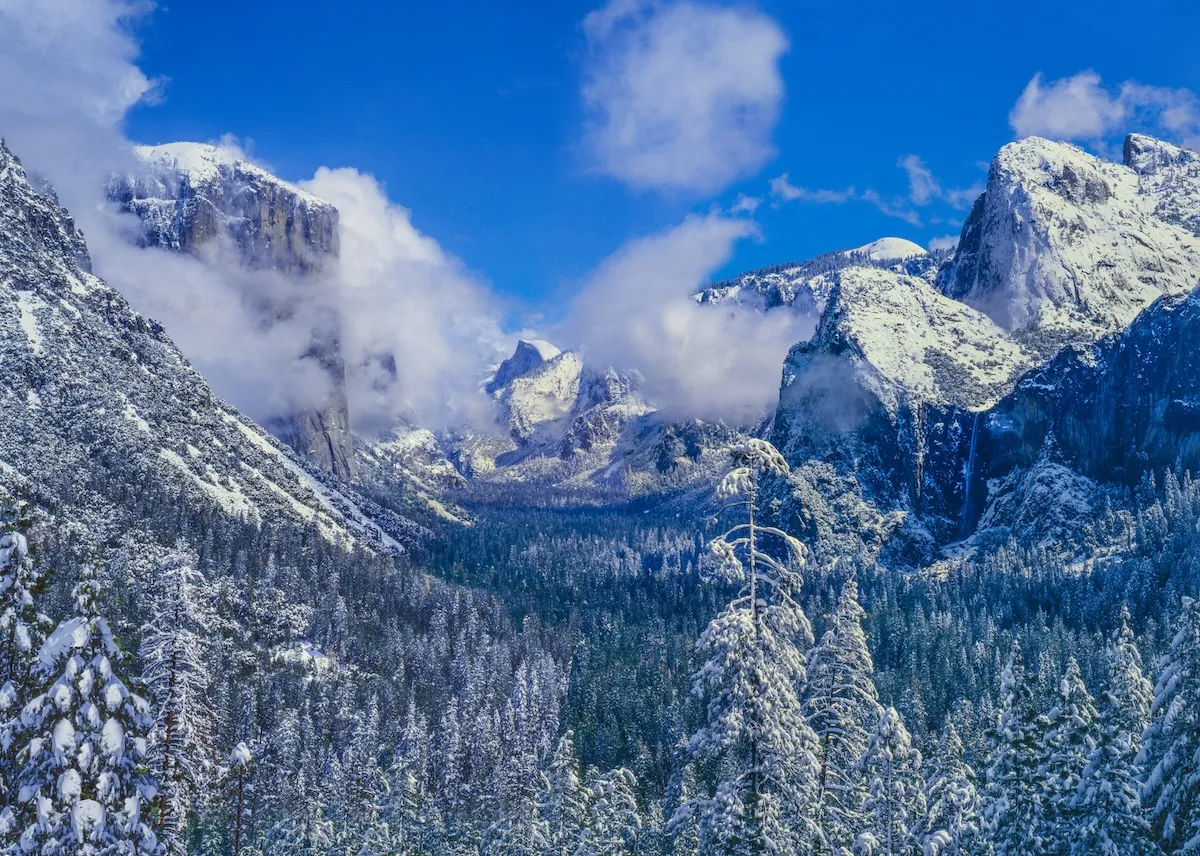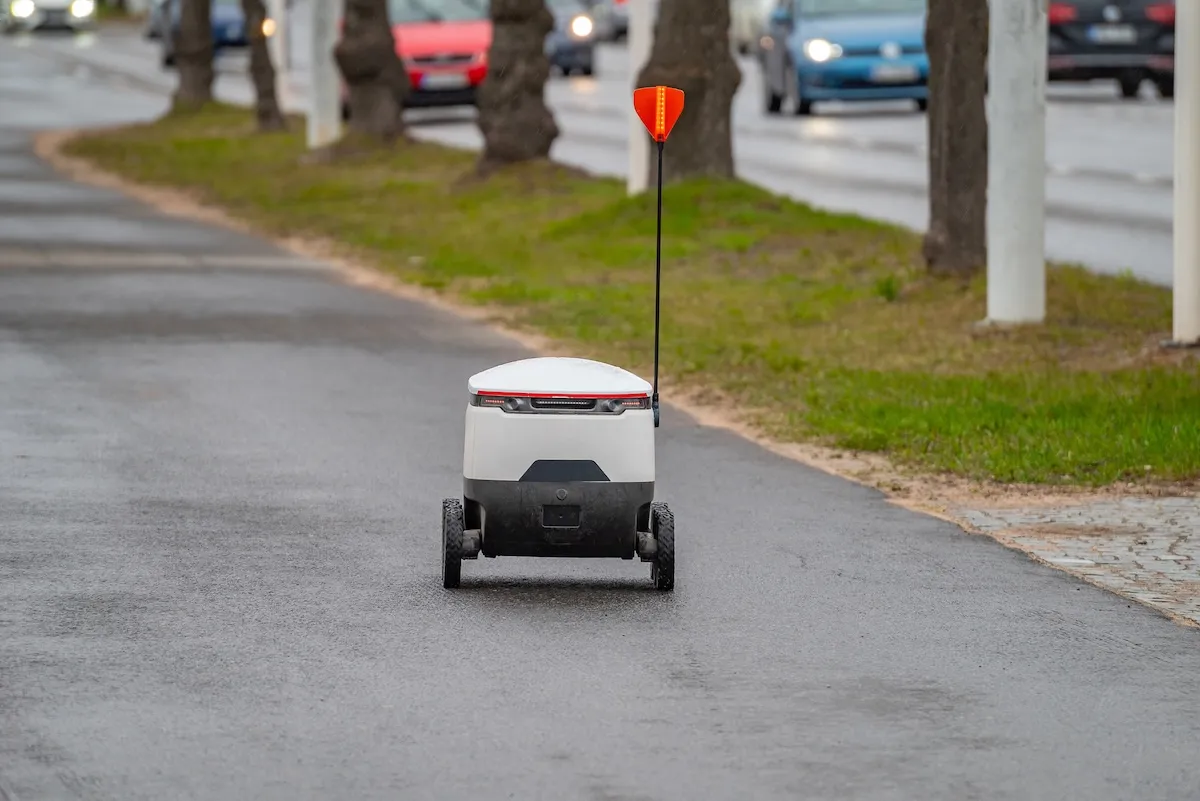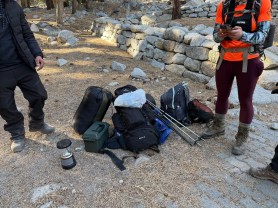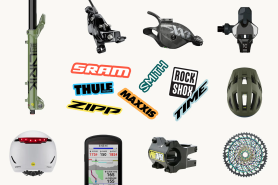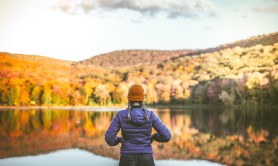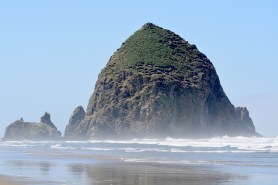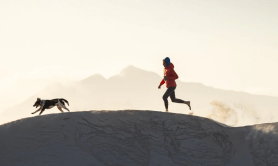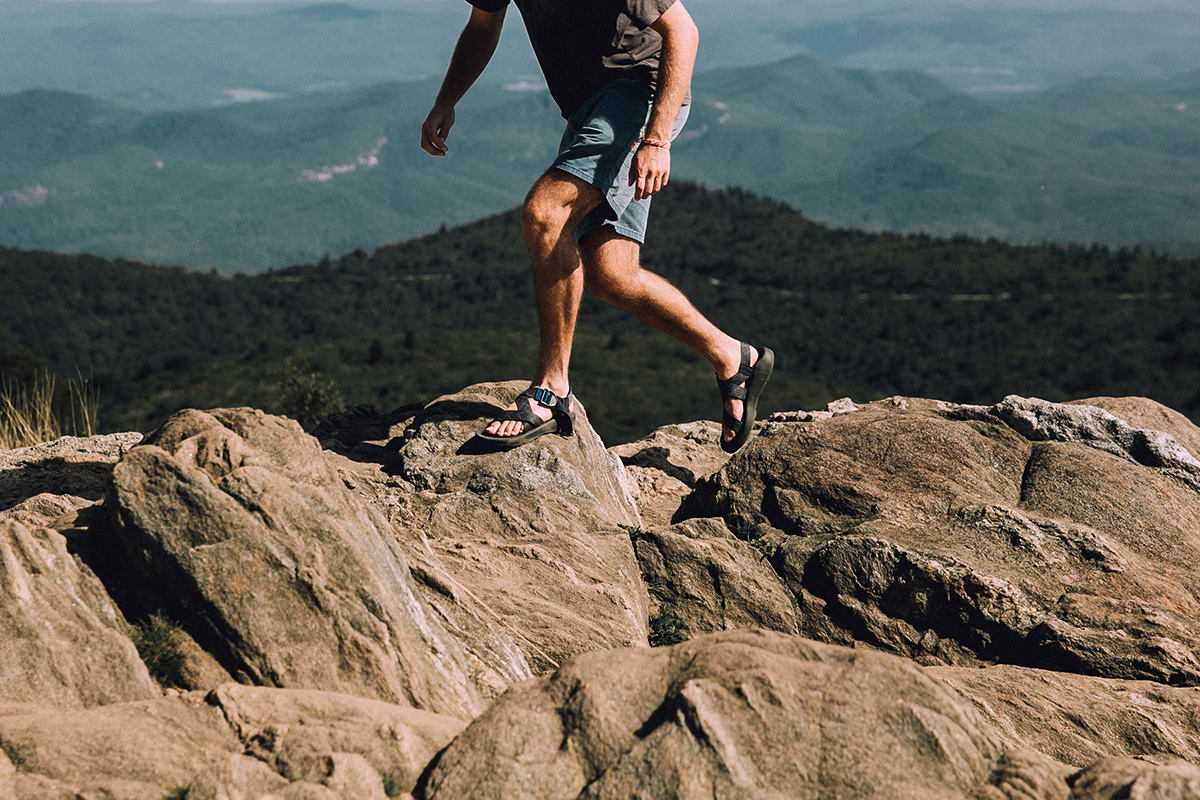

I remember chuckling at one of my friends as we loaded up his truck for a ski trip to Mammoth. I’d heard of hiking sandals, but the sight of open-toed shoes strapped to the side of a ski bag seemed out of place. With a stern face, he looked over his shoulder and announced, “I never go anywhere without flops.”
Videos by Outdoors
His conviction opened my eyes and I haven’t gone backpacking or camping without a pair of sandals since. These days, people aren’t just bringing flip flops to wear around the campsite at night—they’re wearing them for the entire hike.
I’m not suggesting you ditch your hiking boots and everyday shoes for beach sandals, but the best hiking sandals are definitely worth adding to your gear.
The Teva Terra Fi5 is our top pick because of their overall comfort and versatility. We rounded up some more of the best hiking sandals out there to help you find the right pair for you.
This post contains affiliate links. Outdoors.com may earn a commission when you make a purchase through these links. Thank you for your support.
Quick Summary of Our Top Picks
- Best Overall Pick – Teva Terra Fi 5
- Best for Arch Support – Chaco Z/Cloud
- Best Closed Toe Option – KEEN Newport H2
- Best for Women – Merrell Terran 3 Cush Post
- Best for Casual – Birkenstock Arizona Soft Footbed Sandals
Our Picks for the Best Hiking Sandals
Best Overall Pick – Teva Terra Fi 5
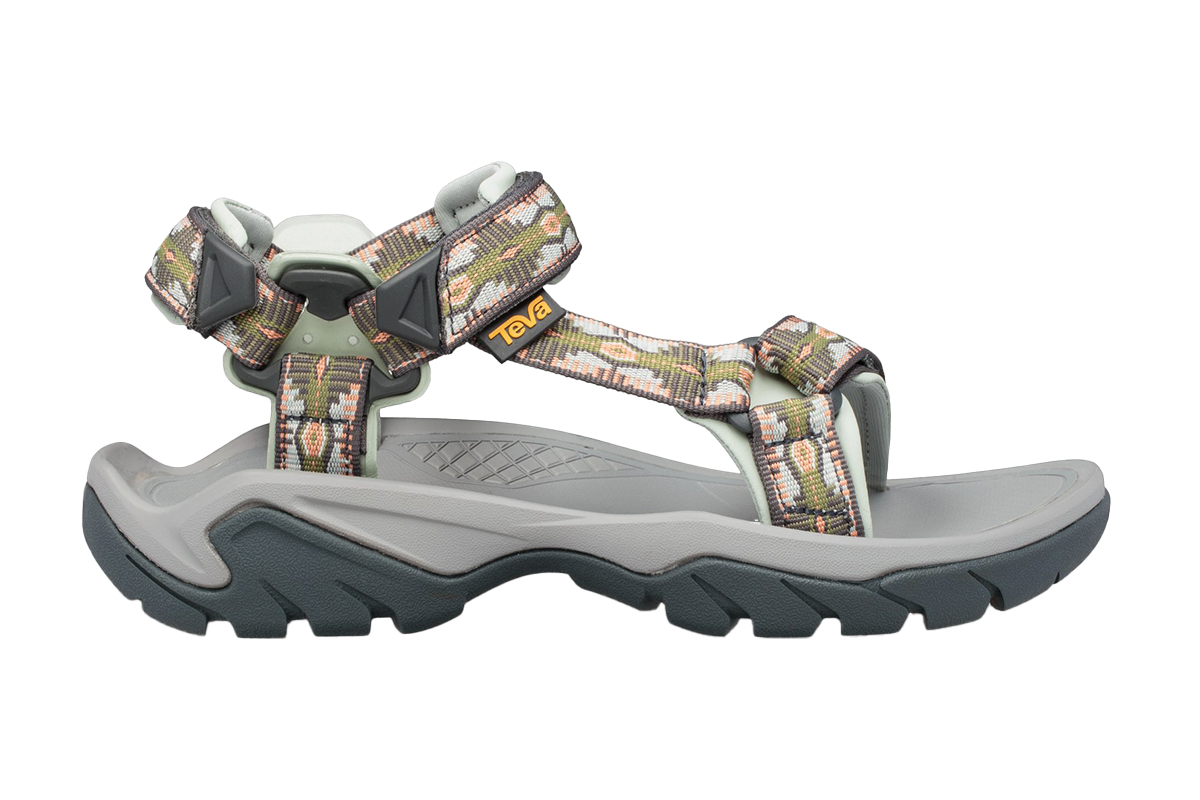
Men:
Women:
Teva has always made some of the best hiking sandals and the Terra Fi 5 is a versatile and comfy option that works for just about everybody. Unless you need traction on particularly loose surfaces, these are a safe bet.
The claim to fame for the Terra Fi 5 (and Teva in general) is comfort. The soft polyurethane midsole cradles feet with a soft platform and raised edges to add stability without making you ratchet down the straps. The hook and loop straps are easily adjustable, though, so you can tighten or loosen the fit around your ankle or the ball of your foot on the fly.
Just about the only thing holding these hiking sandals back is the relatively modest tread pattern. That might prevent them from becoming the ultimate backcountry sandals, but it won’t stop them from being your favorite hiking sandals.
Why we love it: If you need one hiking sandal to do everything, the Teva Terra Fi 5 is where it’s at.
Things we’d change: These are great at everything, but not the best at any one thing.
Best For Arch Support – Chaco Z/Cloud
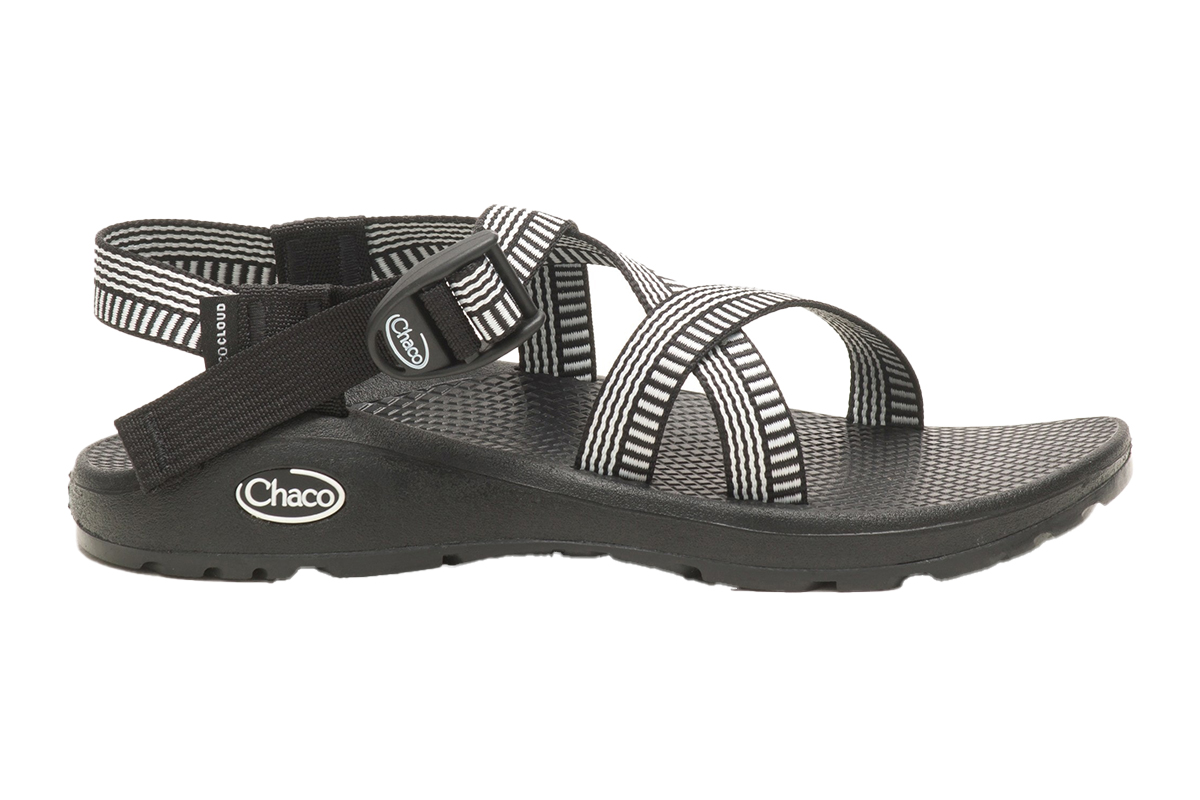
Men:
Women:
If it isn’t broken, don’t fix it. That must have been the thinking behind the Chaco Z/Cloud because the sole of this hiking sandal looks like it came straight off your favorite boots.
These hiking sandals are perfect for backpacking and long trail hikes that demand extra cushion and support for your feet. Four straps on each sandal keep feet locked in place with a secure fit, and high arch support will keep most people’s feet feeling strong mile after mile.
We’d like to see a more aggressive tread pattern on these hiking sandals and the high arch support might not be optical for everyone. If those aren’t deal-breakers, the path to open-toed backpacking begins with a pair of Chacos.
Why we love it: This burly hiking sandal is supportive enough for backpacking.
Things we’d change: These feel heavy and clunky compared to minimalist sandals.
Best Closed Toe Option – KEEN Newport H2
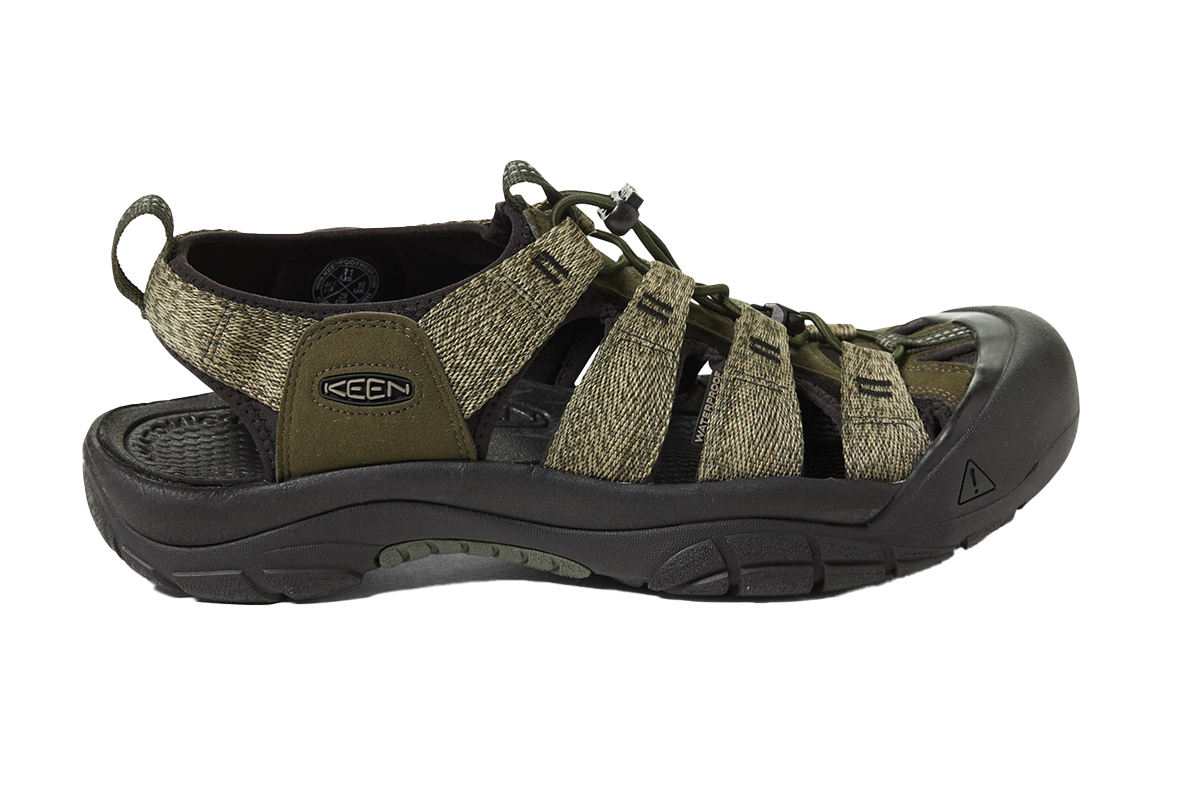
For Men:
For Women:
The biggest problem with open toe sandals is the inherent lack of protection from cuts and scratches. The KEEN Newport H2 combines the airy breathability of sandals with the security of a closed-toe shoe.
The rubber outsole of these hiking sandals wraps over the toe area to protect your foot like a shoe or boot. Polyester webbing in the upper hugs your feet, a bungee system works like shoelaces to create a good fit, and natural odor control keeps these sandals from smelling like they’ve been on the trail as long as they have.
This closed toe sandal crowds the line between sandals and shoes, and that’s a winning strategy for a lot of people who spend their free time outdoors. Go ahead; air out your feet without worrying about hurting them.
Why we love it: A hiking sandal with toe protection? Yes, please.
Things we’d change: These are inherently less breathable than most hiking sandals.
Best For Women – Merrell Terran 3 Cush Post
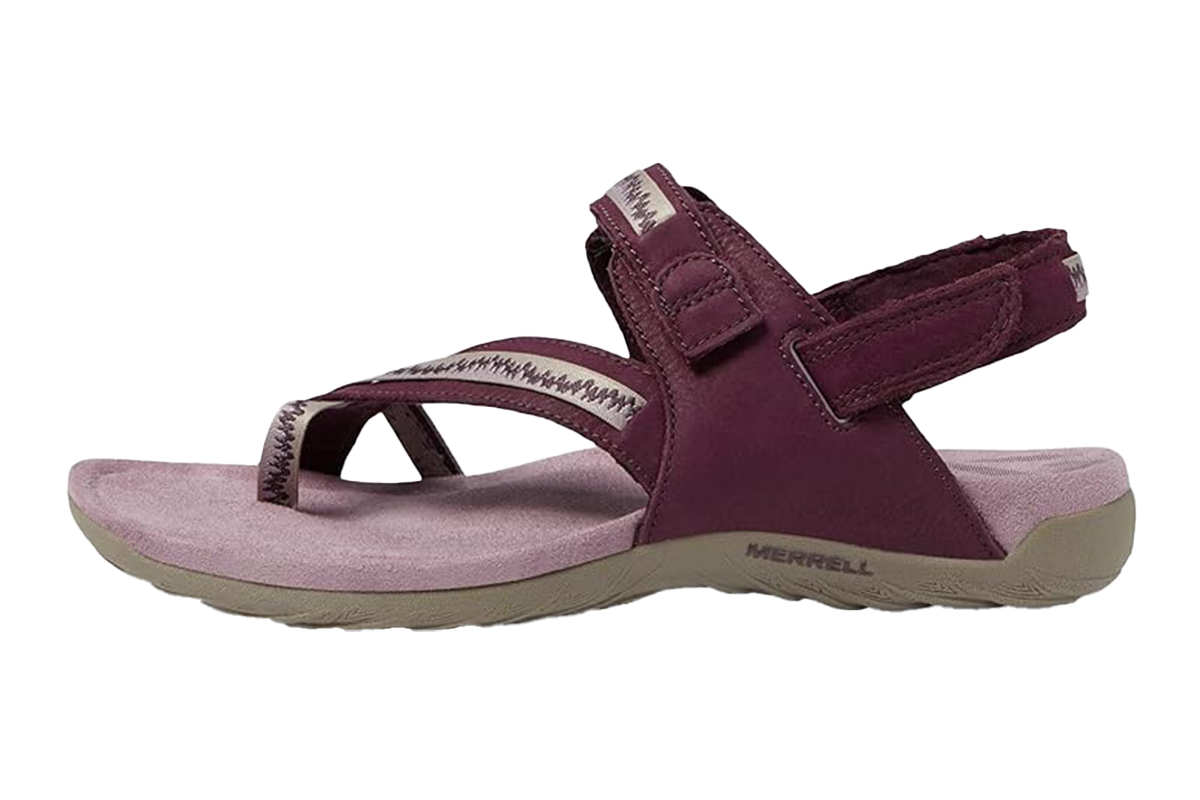
For Women:
If you love sliding into a pair of flip flops but want something more substantial to get you through the day, the Merrell Terran 3 Cush Post is the perfect way to make sandals your go-to street shoe.
Merrell sells several variations of the Terran 3 but we’re partial to the Terran 3 Cush Post. This style has a single post and toe loop for the big toe so it fits like a flip flop. The ankle straps and plush footbed make it far more comfortable to wear all day, though, and the TPR outsole is able to get traction on all kinds of uneven terrain.
There’s no men’s version of this sandal but it’s so popular we had to include it anyway. If you want a sandal that can handle light hiking (think the kind that involves a to-go cup from your favorite coffee shop) and everyday wear, this is the answer.
Why we love it: The Terran 3 Cush Post is more stable than a flip flop and stays comfortable all day.
Things we’d change: Sorry fellas, this sandal is only available in a women’s version
Best For a Casual Hike – Birkenstock Arizona Soft Footbed Sandals
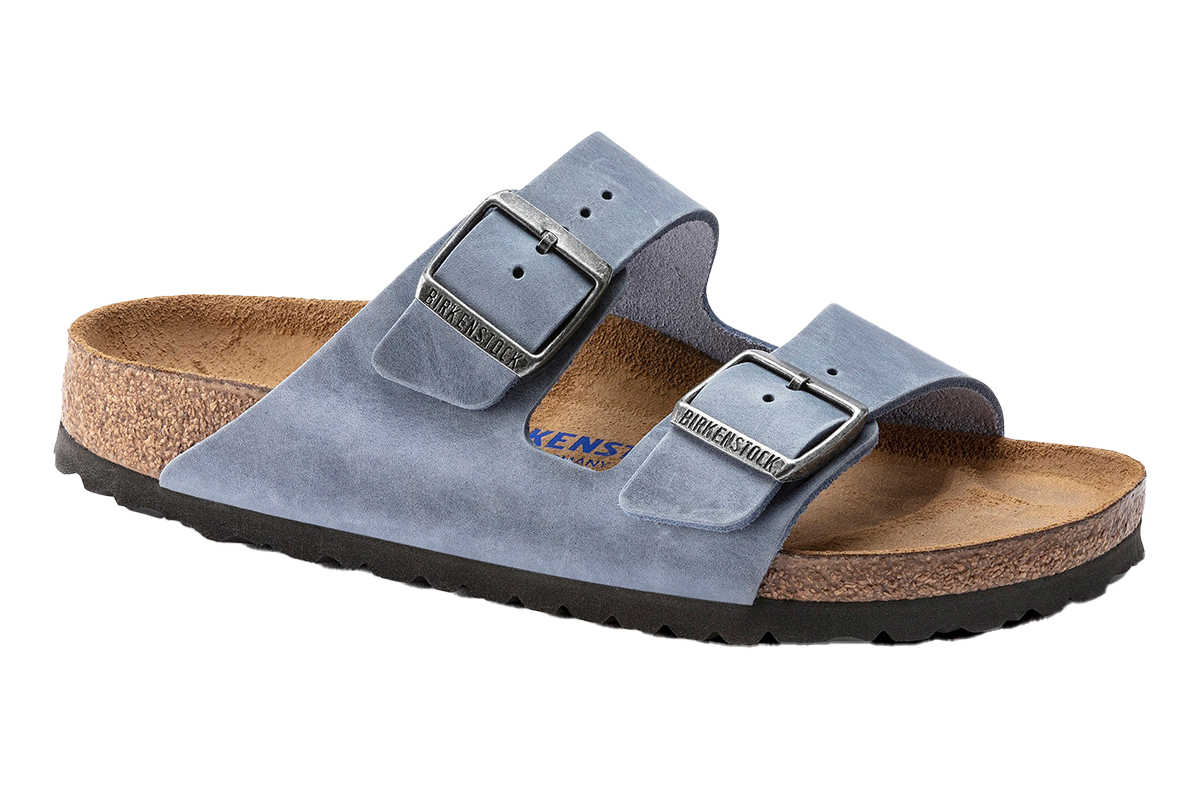
For Men:
For Women:
Don’t worry, we didn’t write a best-of sandals list without including Birkenstock. The Arizona soft footbed sandal isn’t exactly a heavy-duty, modern hiking sandal but it’s probably logged more miles than any other open-toed footwear.
Birkenstock’s secret lies in the footbed, which is suede over cork instead of rubber or polyurethane. Adjustable leather straps and metal buckles let you get a great fit while offering a world-famous look. The EVA outsole is long-lasting but the tread is very shallow and best suited to use when traction isn’t a concern.
Ask anyone with a pair of Birkenstock sandals, and they’ll tell you these are some of the most comfortable sandals you’ll find. They last years and don’t seem to be subject to the shifting trends of the fashion world, so help yourself to something good.
Why we love it: These sandals are iconic for a reason—they’re extremely comfortable.
Things we’d change: These are great for lots of outdoor activities, but you probably want more support and traction for more intensive hiking.
What to Look for in Hiking Sandals
Sandals can be great for lounging, walking around town, or hiking—but maybe not all three. Here’s what you need to know to avoid strapping on the wrong pair.
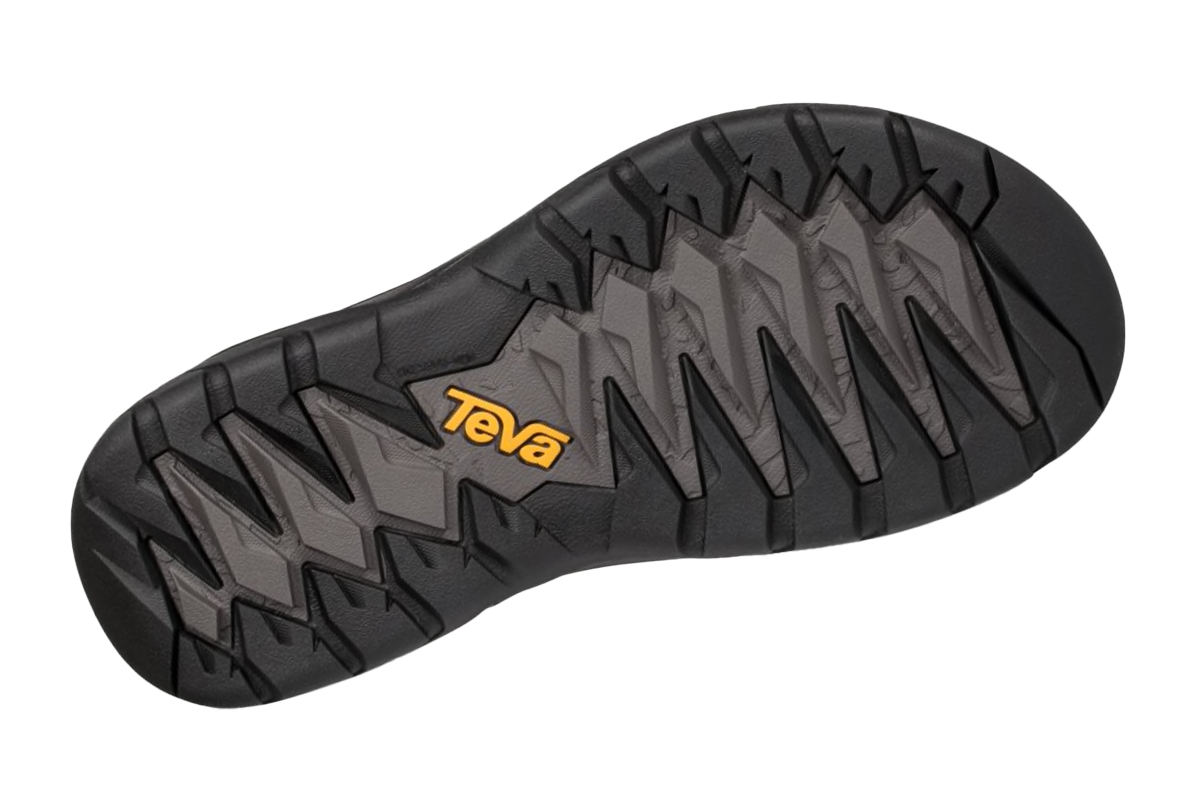
Types of Hiking Sandals
Most hiking sandals can pull double-duty as everyday street shoes, but the opposite isn’t necessarily true of casual sandals. For serious hiking and backpacking, look for sturdy sandals that lock your foot in place. If you hike in rugged terrain, consider closed-toe hiking sandals that offer more toe protection against cuts and scrapes.
If you want something to wear as a camp shoe or everyday sandal out on the town, you can open up your search to hiking sandals that focus more on comfort and style. There are even some great minimalist sandals with a single toe loop that bridge the gap between hiking sandals and flip flops.
Features You Should Look For
Sole and Arch Support
As with any shoe, the sole is going to play a major role in how well a hiking sandal fits your foot shape. Manufacturers use materials like rubber, EVA foam, and cork to create a comfortable footbed.
Arch support plays a crucial part in keeping your feet in good condition, so pay attention to how high the arch is on a hiking sandal relative to the shape of your feet. More isn’t better; you need to match your footwear to your feet. Arch height is as personal as foot length and width.
Luckily, it’s a lot easier to see a footbed on sandals than it is on boots or shoes. When buying online, we recommend buying multiple sizes of footwear so you can get a true side-by-side comparison and find the best fit. You can return the sizes you don’t want, often for free.
Straps
Manufacturers are creative with strap placement on hiking sandals, so there’s a lot of variety to choose from. The placement of a toe strap, ankle strap, heel strap, or nylon webbing will affect how securely a sandal fits your foot and whether or not it’s stable enough for hiking or scrambling over wet rocks. Look for an ankle and heel strap that hold your foot in place to prevent side to side, as well as front to back movement.
If you’re looking for a pair of everyday outdoor sandals instead of trying to replace your favorite hiking boots with a dedicated hiking sandal, you can be a little more flexible. Sandals with a single toe post are very comfortable and perfectly fine to wear around town or even at a campsite as long as you aren’t dealing with wet surfaces.
Tread
Boots need chunkier tread than street shoes, and the same goes for hiking sandals. Look for tread patterns that match the terrain you’ll be walking on. Tall lugs with wide gaps between them will help your sandals bite into the ground and get good traction. This makes a big difference in making safe river crossings and climbing trails covered in loose surfaces like sand and mud.
A smoother rubber outsole lasts longer on hard surfaces like flooring and pavement. It can also be less expensive, so don’t feel pressured into buying hardcore adventure sandals to wear around town. This will open up your options and let you enjoy fashion classics like Birkenstock Arizona sandals.
Brands We Trust
There are a lot of companies making great hiking sandals right now. Some of our favorites include Birkenstock, Chaco, KEEN, Merrell, and Teva. If you don’t find exactly what you’re looking for here, those are some great brands to focus on in your search.
Hiking Sandal Q&A
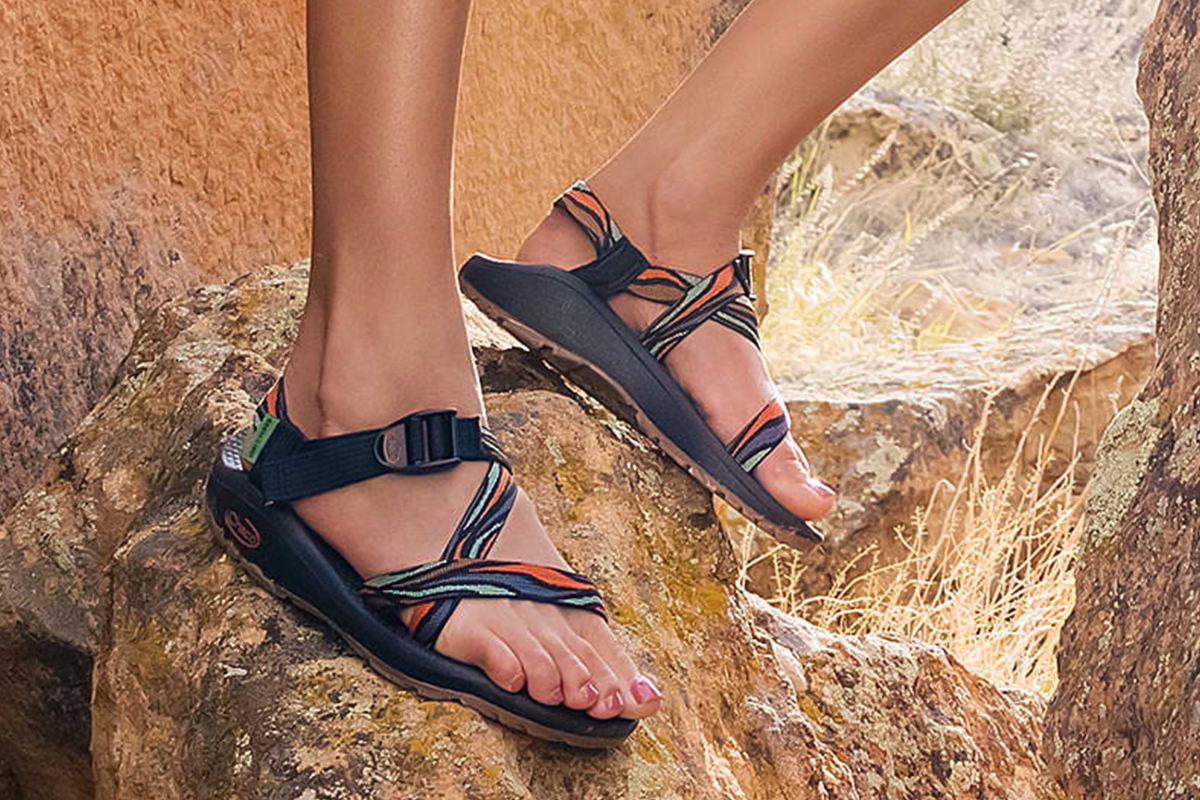
Are hiking sandals actually good for hiking?
Hiking sandals can be good for conquering the trails but don’t throw out your current hiking footwear just yet. Hiking sandals won’t protect your feet from hazards like rocks, thorns, and poison ivy nearly as well as closed toe shoes or boots. They also offer no ankle support.
On the flip side, hiking sandals will keep your feet cooler and give you more feel. As long as they fit correctly, you can avoid some of the hot spots and heat issues caused by boots. People with sweaty feet tend to do well in sandals because their skin can dry more efficiently and avoid blisters and other problems caused by wet socks.
Even if you don’t use hiking sandals exclusively, they can be nice to change into once you set up camp and want to relax and air out your feet after a day on the trail. Since sandals only weigh a few ounces and are meant to get wet, go ahead and hang a pair from your pack when you go backpacking. That way, you can change out of your boots and give your feet a chance to air dry.
Are hiking sandals as good as boots?
A hiking shoe or boot will offer more support and protection for your feet and ankles, but some people prefer the increased feel and dexterity (not to mention reduced weight) of hiking sandals.
One major advantage of sandals is that they’re generally waterproof. As long as the materials can withstand exposure to water, you can wade into water and wipe your sandals dry or let them air dry in a few minutes. That’s a lot better than resigning yourself to wet boots for the rest of your camping trip because they got wet on the first day.
How far can you hike in sandals?
You’ll have to condition your feet to hiking in sandals, but once you do there isn’t much standing in your way. If you need inspiration, look to Susan and Lucy Letcher, two sisters who hiked the Appalachian Trail from Maine to Georgia and back again barefoot. According to these pros, their feet toughened up within a few weeks and they were able to walk on gravel, snow, and even broken glass without hurting their feet. Being able to grip the ground also strengthens little muscles in our feet that we rarely use, so hiking barefoot can make us more resistant to certain injuries.
Hiking completely barefoot is a stretch for most of us, but switching to sandals is an interesting middle ground that might open up some new experiences. The Roman Empire was built by soldiers who marched halfway around the world in what were essentially primitive hiking sandals, so they must be good for something.
Should I wear socks with hiking sandals?
Whether you skip socks or not depends on you, but some sandals don’t work with socks so avoid hiking sandals with a single toe loop if that’s something you care about.
In cold, dry weather, socks and sandals could be a winning combination. That changes if you’re hiking in the rain or an otherwise wet environment though, because socks will absorb water a lot faster than they get rid of it. In that case, you’re better off wearing sandals without socks so your feet have a chance to dry out faster.
Who should wear hiking sandals?
Hiking sandals are for anyone who likes minimalist footwear and spending time outdoors. They’re good for hiking and camping. Sandals are also excellent for anglers who spend time in shallow water (as long as it’s not too cold) because they dry so much faster than boots or shoes. They’re significantly less expensive than waders, so they’re worth a look.
Sandals are also useful in extremely hot climates (as you might guess by looking at what people wear in deserts and jungles around the world). With no socks, leather, or synthetic material to trap heat, your feet can stay cooler and dryer when the temperature and humidity climb. Just remember that your feet will also be exposed to sunlight, so you’ll presumably have to use sunscreen to avoid getting painful sunburns on the tops of your feet.
Are hiking sandals environmentally friendly?
Sandals require fewer raw materials than shoes or boots, so they should have a marginally smaller impact on the environment in that regard. Companies that sell hiking sandals tend to be on the more environmentally conscious end of the manufacturing world, so many of them publish information about the steps they take to go above and beyond with sustainable business practices.
That being said, there’s more to being a responsible consumer than buying products made with recycled materials. It’s better to buy a quality item, repair it when necessary, and get years of use out of it than it is to blow through a bunch of cheap or greenwashed products in the same amount of time.
